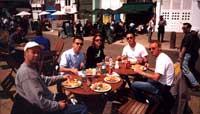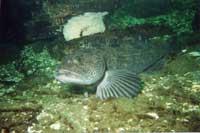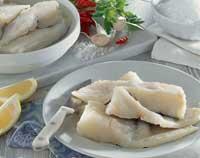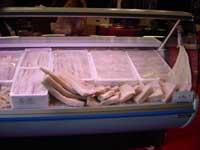Lots of sauce and little cod

The Basques have fished cod for a long time. For this reason, in our docks stands out the footprint of the fall of cod. Pasaia, for example, was the main cod port in Spain, but currently only four pairs of boats remain. The reduction of the number of boats shows that cod fishing is not profitable for Basque fishermen, both for the reduction of catches and for the need to go further and further.
The decline in the cod population was noted in the 1990s. It should be noted that in the years 30 to 40 previous the cod fishing was very abundant and that surprised many people. To prevent the situation from getting worse, conservation groups resisted and, among other things, banned cod fishing in Newfoundland. This prohibition, introduced in 1992, is still in force today.
Research shows that the water temperature in Terranova decreased. As a consequence, the mortality of cod after laying increased considerably, since it is then when cod is more vulnerable. This is, at least, the explanation given by the researchers. They say the ban on Newfoundland came too late. For more than ten years, cod has not been caught and the population has not grown, on the contrary, there is less and less cod.

However, the decrease in cod in the area of Ternua has been partly imputed to scientists. Apparently, the fishing quotas were not properly calculated, they were excessively optimistic when calculating the cod population and, consequently, more than the species could bear to survive was captured.
However, scientists expected that the fishing ban would increase the population and that as the climate was tempered the problem would be solved. But as on other occasions, half of the conviction was corrupt. The surface of the sea has been heated, but cod has not done well, at least in the long run.
In the beginning cod enjoyed the increase in temperature, which caused an increase in plankton. Young bacalaos feed on plankton, so by increasing the amount of plankton came younger to adulthood. This increase in plankton also indirectly affected adults due to the largest population of fish that were fed.
Therefore, in more temperate water, young bacalaos and adults had more food. But this fact was not as simple as they expected. In fact, the cod larvae also feed on plankton, specifically feed on the eggs of copepods, some small marine crustaceans. Well, the temperate of the sea caused the copepods to mature later than normal, so the laying is later and the cod larva at birth finds little copepod egg.

It has been quite clear that we were not able to predict how the sea temperature affects cod. The Atlantic cod ( Gadus morhua ) is undoubtedly a species conditioned by the environment. Any change in the environment seems to affect you if it is not in a stage of the life cycle.
Let's look at the sea. Cod has not only diminished on the other side of the ocean, but it is also increasingly scarce in the North Atlantic of Europe and the North Sea, although it is believed that it is not yet endangered.
As cod is a cold water fish, it has gone north as the water has been tempered. It is followed by the Basque ships heading to the north Atlantic. Most of the cod that is eaten in Euskal Herria is of external origin, it is not of the fishermen here. And it is that, although the catches are smaller, the demand has not dropped and it can be said that it has increased, since in general more fish is consumed.
The islands of Iceland, Norway and Faroe are the ones that provide the most cod. These villages have cod cod coves nearby and the fishing tradition is no more modern than the Basque one. According to historians, the Viking villages of northern Europe were the first to fish cod. The Vikings fished cod on the Scandinavian coast for the year 1000.

In any case, the Basques were the ones who revolutionized the area, since they invented salted cod. They realized that this strong fish remains salted for a long time. Thus, when they went to fish the whale towards Ternua and Labrador, they took advantage to fish the cod and the cod was their main food.
Thanks to cod, the villages of the Atlantic coast have faced more than one hunger. However, more than the species could bear has been exploited and the time has come to return the amount due to it. It is too late.
Published in 7K.
Buletina
Bidali zure helbide elektronikoa eta jaso asteroko buletina zure sarrera-ontzian











